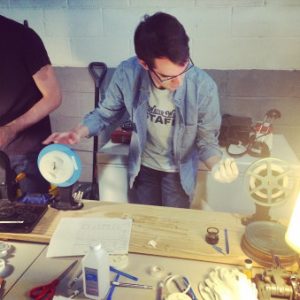Ethan Gates (@The_BFOOL) is currently a Moving Image Archiving and Preservation Technician for the NYU Dept. of Cinema Studies. He attended the AMIA/DLF Hack Day event at AMIA’s annual conference, and was a ‘virtual cross-pollinator’, connecting ideas and conversations between AMIA and DLF. You can find his blog here.
“I’m in!!”
What would a “hack day” be without a few classic hacker catchphrases? Despite the now-ubiquitous presence of (and our constant fiddling and frustration with) digital tech, the idea of hacking still conjures up romanticized ‘90s-pop-culture-influenced images of loners in darkened rooms tapping furiously away at click-clacking keyboards, illuminated by CRT monitors.
But when she let out that intense declaration, my AMIA/DLF Hack Day teammate wasn’t infiltrating Cyberdyne or bringing down the FBI from the inside – she just finally remembered her login information to edit the A/V Artifact Atlas wiki. And she wasn’t alone in a ramshackle, desktop-cluttered apartment – she was in a quite spacious, Art Deco-era hotel ballroom surrounded by team members and other Hack Day attendees, all engaged in constant, considered in-person conversation.
This was the first time I attended an AMIA/DLF Hack Day, and I wasn’t entirely sure what to expect. I knew that archivists, developers and students of all skill levels were encouraged to attend and contribute, but having only in the past year or so started to teach myself various programming and digital tech interfaces/software, I was still unsure about how specifically I could contribute to a “hacking” project.
Turns out, hacking is pretty easy – you just have to talk!! Sure some of the groups or attendees engaged in more “traditional” hack activities like coding, editing, data mining, etc. – but my Hack Day experience (and really, the whole AMIA conference) was defined by informed debate and reflection: what are the problems in digital preservation and technology we encounter on a day-to-day basis as archivists, librarians, scholars and conservators? What tools do we wish existed to help solve those issues? What solutions and work-arounds already exist in the field? You don’t need to be an expert coder to join in this kind of dialogue.
What was so particularly fantastic and productive about Hack Day was the pure flood of questions being asked and addressed from so many different angles at once. While my particular team hashed out solutions to improve parseable, discoverable metadata for video error logging, I could hear the table next to us debating what fields could be added to WikiData’s registry of file format properties to expand its use as resource for digital preservation. And at the same time, over my Twitter feed came queries from the DLF Forum about interoperability of technical specs for A/V and images, privacy regarding web analytics, representing marginalized communities in digital collections, on and on.
Some of these challenges we made or provided answers for (check out the Hack Day project summaries on our wiki!), some are obviously not going to be solved in a day. But because of my brief time as a Virtual Cross-Pollinator and “hacker”, I’m so encouraged that all we need to break the entrenched system and develop new ideas is simple collaboration and communication. We’re in, folks.

